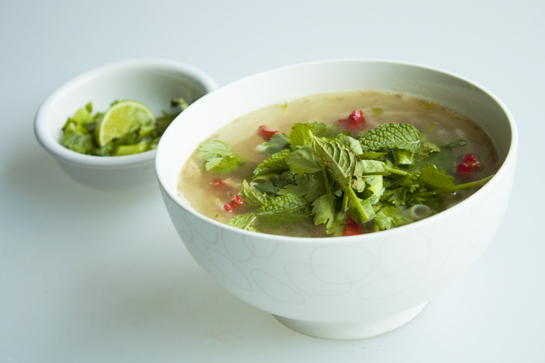True Life Stories & True Life Issues
Hey Health Food Lovers! Today we have a great guest post by writer, Naturopath and Food As Medicine Coach Catie Payne! I know you all are going to enjoy Catie’s post (she is an amazing word-smith!) Please show Catie some love by letting us know what you of think of her post in the comments section! Also do make sure to check out her blog (Head Plant Health) and FaceBook page! Thank you Catie! -Michelle.
Shake what yo nanna gave you
Words by Catie Payne
Elbow deep in a cauldron of bobbing animal parts was not a place I expected to find myself in my pursuit of whole-food, Naturopathic expertise. Cauldron’s, potentially. But ’twas not the full moon, nor was I sporting a possessed broomstick or vial of serpent tears. No, this was outside the scope of witchcraft and wizardry.
Yet here I was, fishing out the addled bones of a dismembered bovine, straining gelatinous broth through an industrial sieve, and wiping a dripping, lard-encrusted hand across my forehead as I stood back to take stock of, well, the stock. For that’s what I was brewing. But not your average, powdered, MSG-laden, sacheted supermarket variety; this was a stock to do my grandmother proud. And her grandmother. And cavemen before that!
I was embracing the incredible wisdom of generations past with cooking methods to put us, in our convenience-worshipping ways, to shame.
Michelle exposes us to an amazing array of traditional wholefoods on her blog, with preparation techniques that challenge what we think we know about food, nutrition and the limits of what’s edible. Although we peruse these fabulous posts with wide-eyed wonderment, when it comes to enacting such traditions, we can be a little less forthcoming. I for one need to be poked and prodded into compliance, inspired by the health benefits and propelled into liver-loving, broth-brewing action.
(Above: Pho made with bone broth!)
Making such a broth from leftover animal bones was once a common practice, with cast iron tubs brimming with the limbs of beasts, simmering in the corners of kitchens everywhere. Not only were these parts cheap, but they were also coveted for their sensational nutritional profile.
When a whole heap of feet, fibulas and femurs are boiled for 24-48 hours, the minerals present in this powerhouse of connective tissue are released. Calcium, phosphorus, magnesium, and potassium are liberated. Chondroitin, as found in supplemental formulas for arthritis and joint complaints, is naturally occurring. Collagen is sucked out, hoovered from within the bone matrix like a twisted liposuction procedure, becoming a sippable, liquid infusion.
Yes, collagen. That miraculous compound supporting the collective smiles of Hollywood, and keeping our plasma screens free from furrowed brows. Marvellous stuff!
So although the stewing and the bubbling and the 48-hour stove-top vigil may seem far removed from our modern conception of cheffery, I can assure you that unearthing these traditional practices and honouring the laws of universal Nanna-dom is well worth the effort. (And the temporary conversion of your kitchen into a small-scale abattoir).
After all, there is a recent resurgence of Grannie-chic; with knitting, kitsch crafts and the humble cup of tea all making glorious comebacks. Why not extend our yesteryear fetish to encompass traditional food preparation? Especially when returning to our culinary roots offers such startling benefits to our health, budget and engagement with our grub.
Sally Fallon in her bible of old-school cuisine Nourishing Traditions, says this of modern life. “Technology can be a kind father but only in partnership with his mothering, feminine partner – the nourishing traditions of our ancestors. These traditions require us to apply more wisdom to the way we produce and process our food and, yes, more time in the kitchen, but they give us highly satisfying results – delicious meals, increased vitality, robust children and freedom from the chains of acute and chronic illness.” (pp. xii).
If you were just beginning to wrap your sceptical noggin’ around bone broth, read on for further delights!
Pickled herring, fermented vegetables and rendered duck fat would have your Nanna twirling her walking cane like a flaming baton. Offal ranks highly, liver is prized, and slippery organs (to put a smirk on the steely face of Bear Grylls) command centre stage.
Perhaps I’m framing this with a little extra comedic exaggeration to pique your interest… But the fact remains that although these ingredients and methods sound ‘icky’ to our supple contemporary eardrums, they offer incredible, healthful remuneration.
Better yet, the emphasis on utilising every part of the animal appeals to our environmentally conscious hippie sensibilities. Minimising waste and employing every part of the animal is, in fact, a beautiful way to respect our food. Wrestling beef bones into a pot, we are forced to engage. Simmering pig skin for lard, we contemplate the humble life that has given us a tasty addition to our own.
So next time you sit daintily sipping your third cup of Grandma’s famous brew, take a moment to appreciate the traditional practices that garnished the lives of men and women only two generations ago. Traditions bursting with flavour, economical savviness and healthful, nourishing ingredients. Taking one more swig of your salty bone broth, resolve to tackle your dietary demons and embrace a forgotten recipe, paying tribute to the hippest of happening grandparents in their infinite culinary wisdom.
Fallon, S 1999, Nourishing Traditions, New Trends Publishing, Washington, DC.
Catie Payne is a writer and Food as Medicine coach. She regales whoever cares to listen with tales of whole foods, quirky herbal tips and ways to generate vibrant health and happiness at her blog, Head Plant Health.
Archives
- May 2020
- October 2019
- November 2018
- October 2018
- September 2018
- May 2018
- April 2017
- March 2017
- December 2016
- January 2016
- December 2015
- November 2015
- October 2015
- September 2015
- August 2015
- July 2015
- June 2015
- March 2015
- January 2015
- September 2014
- August 2014
- July 2014
- June 2014
- May 2014
- April 2014
- January 2014
- December 2013
- November 2013
- October 2013
- September 2013
- June 2013
- May 2013
- April 2013
- March 2013
- February 2013
- January 2013
- December 2012
- November 2012
- October 2012
- September 2012
- May 2012
- March 2012
- January 2012
- December 2011
- November 2011
- October 2011
- September 2011
- August 2011
- July 2011
- June 2011
- August 2010
- July 2010
- January 2010
- December 2009
- November 2009
- October 2009
- July 2009
Resources
Comments
- Twin Cities janitorial: Cleaning does not have to
- Maid Services: Your blog leaves an interesting
- Probiotics – A Virus Remover | One Shot One Place: [...] In today’s world, doctors
- Andre: Having IBS for many years
- Kimi @ The Nourishing Gourmet: Beautiful photos! We love sweet
- cadeau: Well these tips are very
- Forex Foreign Exchange Rates: I somehow dont agree with
- ?????????: Great article . Will definitely
- flomax: nice
- Linda: truelifeblog.com has become a favorite




Leave a reply